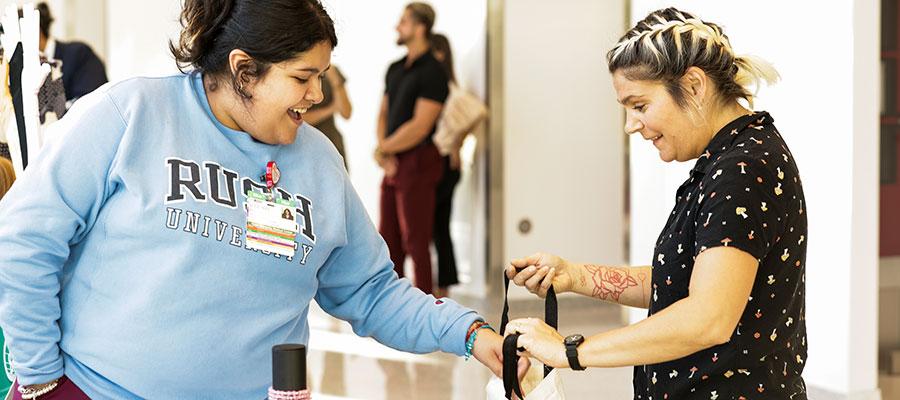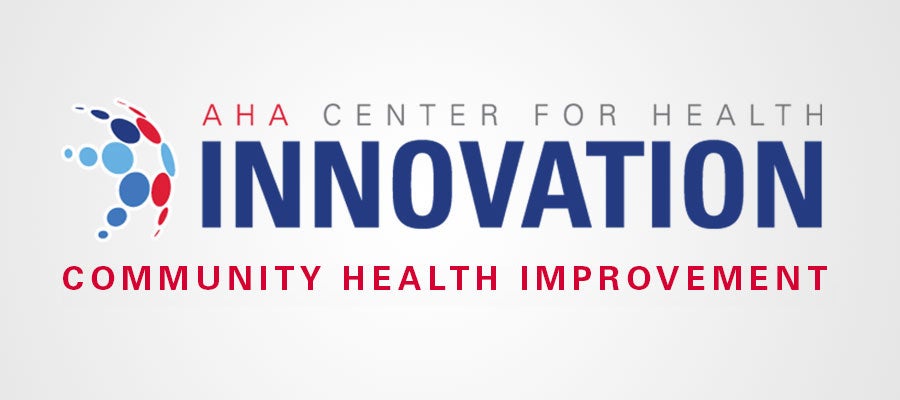Innovations in Improving Community Health: The CHW Hub at RUSH


Community health workers have become an essential component of RUSH University Medical Center’s efforts to minimize inequities in health and life expectancy. CHWs provide much-needed resources across the RUSH campus and several Chicago neighborhoods, while also being a driving force for partnerships and programming in a variety of care and community settings.
As the life expectancy gap in the city of Chicago shows, this work is greatly needed: People born in the Loop — downtown Chicago — are likely to live 14 years longer than those born in the West Side neighborhood of East Garfield Park. Residents of Chicago’s South and West Side neighborhoods have higher mortality rates due to chronic illnesses, a reality exacerbated by the COVID-19 pandemic.
Focus of CHW Hub at RUSH
Since its launch in 2018, the CHW Hub at RUSH has worked to ensure positive health outcomes for patients by promoting interdisciplinary partnerships and care coordination that provide valuable resources and necessary services to patients — all of which help reduce disparities in health outcomes. The CHW Hub is made up of a centralized workforce of individuals who serve as liaisons between community members and available resources and services. The CHWs also are trusted members of the community who have built relationships that allow them to effectively provide outreach, education and social support.
Collaborating to build strong internal networks and external community partnerships creates a path for reducing disparities in health outcomes, and CHWs are a vital link in this work.
The CHW Hub focuses on six core areas: continued public health response, the emergency department, community settings, chronic disease management, youth programs, and connection to care. For individuals who are not receiving care on the RUSH campus, CHWs meet them where they are, including at community events or at churches.
Paving the Way for Reducing Disparities in Health Outcomes
Collaborating to build strong internal networks and external community partnerships creates a path for reducing disparities in health outcomes, and CHWs are a vital link in this work.
Beyond collaborating internally to improve clinical integration and social care coordination, RUSH has several external partners who financially support the CHW Hub. The Hub is entirely grant-funded, with a portfolio including private, public and government partnerships. Grant-funded initiatives vary based on the needs of communities, allowing the CHW Hub to be both responsive and proactive. For example, the Chicago Department of Public Health continues to partner with RUSH in funding public health response initiatives, which are implemented by interdisciplinary teams of CHWs, registered nurses, social workers and medical assistants at RUSH and in the community.
CHWs use the Unite Us platform to connect patients with appropriate resources and services, working to meet the health and social needs of individuals living throughout Chicago. These resources are considered closed-loop referrals; after CHWs complete social needs screenings, organizations such as Top Box, the Community and Economic Development Association of Cook County, and the Spanish Coalition for Housing are alerted to the referrals. Someone from the community organization then reaches out to the patient to coordinate resources, adding an additional point of contact. This process increases the uptake of resources and services, since the responsibility of reaching out does not fall on the patient.
The CHW Hub is deliberate in providing support for CHWs as they work with patients by providing direct escalation to social workers in cases of crisis and having clear role delineation and referral protocols in place for social workers and registered nurses. Additional support for the CHW Hub is provided in the form of training, development opportunities and monthly trauma processing sessions led by social workers.
CHWs’ Role in Building Strong Community Partnerships
Working with community organizations and building partnerships can foster a deeper understanding of what individuals and communities need. Addressing health and social needs is most effective when programming meets community members where they are and when the emphasis is on building trusting relationships. For example, a hospital may partner with a local church to hold workshops on chronic disease management so people convene in a neighborhood space that is comfortable if slightly unconventional. In these community settings, CHWs can offer key assistance and support in outreach and education.
Finding unique approaches to improving access to resources that address health and social needs requires integration at all levels, from both clinical and nonclinical applications. When teams across multiple disciplines are part of the patient referral process, it allows each team member to engage in their work confidently and within the scope of their practice.
Hospitals and health systems continue to develop programming that improves access to care and reduces disparities in health outcomes. At RUSH, CHWs provide essential insights and services to address the needs of underserved communities. The CHW Hub is an instrumental asset and an innovative program — one that can happen only through effective partnerships.
Lexi Artman is the system manager, community health strategy and programs, and Teresa Berumen is a community health worker supervisor, both at RUSH University Medical Center in Chicago. Alex Shrader served as a summer intern through the RUSH Education and Career Hub for two years with the CHW Hub team.
To learn more about the RUSH CHW program, visit RUSH Office of Community Health Equity and Engagement.
To explore more community health partnership initiatives, check out the Bridging the Sectors project page on AHA.org.
Measuring the Impact
Since the rapid expansion of RUSH’s CHW Hub in December 2020, community health workers have:
- Made over 20,000 proactive outreach attempts.
- Facilitated over 2,000 connections to care, via referrals to community practice social workers and registered nurses.
- Completed nearly 8,000 social needs screenings (from July 2021 to May 2023).
Check out this poster for more info on how CHWs can improve health and reduce gaps in care.

